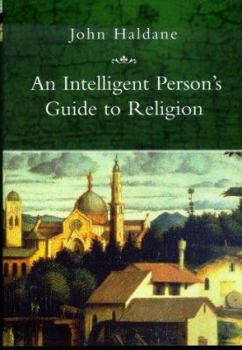An Intelligent Person's Guide to Religion
Select Format
Select Condition 
Book Overview
We live, allegedly, in a postmodern age in which we have cast aside the narrative fantasies of the pre-modern era. If postmodernism represents the final abandonment of all grand theories, where does... This description may be from another edition of this product.
Format:Hardcover
Language:English
ISBN:0715628674
ISBN13:9780715628676
Release Date:November 2003
Publisher:International Publishers Marketing
Length:180 Pages
Weight:0.70 lbs.
Dimensions:0.9" x 4.8" x 6.8"
Customer Reviews
3 ratings
An evenhanded treatment
Published by Thriftbooks.com User , 20 years ago
Philosophy professor John Haldane presents An Intelligent Person's Guide To Religion, a quite scholarly and informative discussion that strives to clarify exactly what atheists deny and theists believe. Individual chapters address the fundamental cosmic questions of death, the meaning of life, value and purpose to existence, the implications of history, the doubting philosophers and more all as applying to religion. An evenhanded treatment, An Intelligent Person's Guide To Religion provides an excellent starting point and reference for theological debate and is highly recommended for its literate, sensitive, and matter-of-fact treatment of passionately charged subjects.
A good discussion of life after death
Published by Thriftbooks.com User , 20 years ago
John Haldane's brief book suffers a little from being about too many things at once, including the nature of scientific explanation, the objectivity of values and the meaning of history, not to mention the more obviously religious themes. Whether or not this book manages to persuade you that being an intelligent person might require you, for the sake of sheer consistency, to seek religious instruction from believers, it does clarify a number of issues in a crisp and attractive way.In particular, the chapter on the very idea of life after death has struck me as easily the best short discussion of what might be involved in such continued - and transformed - existence in the hereafter. Cautious not to indulge in a fantasy of boring heavenly bliss, Haldane remains reticent about the precise shape of the life to come as Christians have looked forward to it over the centuries. Instead, he ponders the general conditions such life would have to fulfil to count (1) as recognisably human life; (2) as the life of a particular person identifiable here and now; and (3) as life worth anticipating and striving for. Unlike much other writing on the same subject, even of a more openly apologetic kind, Haldane's chapter also concentrates on how life after death is supposed to develop and perfect what we already care about most from our earthly perspective. In other words, Haldane argue that our life here on the one hand and our participation in God's own bliss after death on the other are best seen in terms of a single goal.
An excellent introduction to RL and its relationship to L.
Published by Thriftbooks.com User , 21 years ago
It has often been said that the likes of love and humour are best enjoyed and that any attempt to analyse what makes them tick tends to stop them working. It could be argued that this book comes very close to demonstrating that religion is also in this category. Professor Haldane is a very lucid writer and he presents his arguments very clearly. Consequently, it is easy to see that his intention is to present a religious "Theory of everything" that lays claim to being able to explain all aspects of the human condition. A key tool that he uses in this endeavour is his concept of "Religious Logic" (RL) and a formal theory of this could be developed. After all, such things have been done before. Since Galileo won the battle about the Earth being in orbit around the sun, religion has been retreating from rational logical arguments into the shadowy areas of mystery where the unknown reigns supreme. It has had to do this because the scientific method has proved its superiority over Biblical revelation in so many ways and tends not to make claims that it can't substantiate. Haldane's RL rejects all this and presents its own formalism for understanding the world. Inevitably, those of his intelligent readership who are familiar with conventional logic (L) will compare this with RL and, in so doing, they will provide themselves with access to one of the delights that ownership of this book can bestow.Take, for example, Haldane's "proofs" of the existence of God. His first RL argument is essentially as follows: Michael Behe said in his book (Darwin's Black Box) that a biological structure is "irreducibly complex" if it cannot be produced by incremental improvements to an initial function "which continues to work by the same mechanism".This "Argument from Biochemistry" isn't powerful enough for Haldane so he proceeds to "strengthen it by an RL decree":HALDANE: "as one who sympathises with the older medieval ambition to arrive at conclusive proofs I am inclined to treat it in the stronger way summarised as follows.."So: Galileo's insistence that "sympathy" and "inclination" should be specifically excluded from the scientific method in favour of objective measurement is swept aside, the humble (but interesting) bacterial flagellum is irreducibly complex and, in consequence, God is proved to exist. Such is the power of RL theory. In taking this step, Haldane rushes in where Behe (and presumably Angels) fear to tread. We now know that there is strong evidence that the bacterial flagellum evolved from the Type III secretory system via an intermediate structure that provided the dual functions of secretion and propulsion. Consequently, by virtue of his "which continues to work by the same mechanism" Behe can shrug and walk off to try (yet again) to find an instance of his irreducible complexity elsewhere. However, Haldane fails to provide a similar "escape caveat" and his RL claims that such counter arguments do not, and cannot exist, are easily refuted by a






